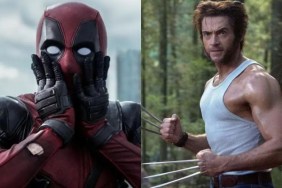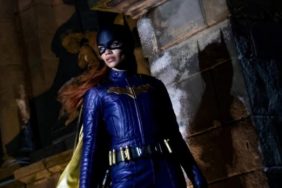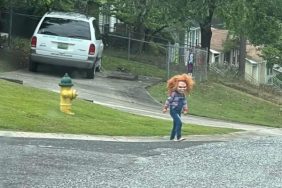
What’s interesting to me is the love triangle is very much the heart of the movie but the sort of focus of the movie is more on Armie and Johnny. You really don’t have any scenes with Johnny. Was there something on the cutting room floor?
Nope. No.
Really?
I was trying to get them to get Tonto to have a dream sequence with Rebecca, but I guess they couldn’t shoe that in.
Just something where you make out for a while?
“Gore, could we not just put in a scene?” [Laughs]
“Just one sex scene. That’s all I ask.”
“Come on! Just for a split moment. Just put it in.” No, I was a bit disappointed with that. There was the conking of the coal on the forehead, but that was pretty much it. The idea, I suppose is that they were kind of two separate worlds and in a way, what’s quite nice about the tone shifts from those two worlds, in quite an unusual way with this film. And I think what’s so unique about it is that tone shift of this kind of Odd Couple duo, and then to this kind of real Western. Tonto represents a kind of… He’s in that mystical world that was also aligned with the Native Americans at the time and also what’s going on with the horse, the wonder of the horse and everything else. He represents that sort of world, I suppose. I come from the real Western.
The actual frontier.
Yeah, the frontier, so the kind of mixing of that world, if this goes to a second one, will perhaps happen more in that. We’ll kind of try and mold in those two worlds a bit more, with more characters.
Were you on set with him at all? Because there’s a scene early on, where he’s in jail and you come in, but I’m trying to remember the coverage. I never saw you in the same shot. Was he even on set that day?
Yeah, he was on set that day and we saw each other quite a lot, like, on set. But we didn’t have any scenes together so unfortunately… He was there, us doing our scene, he was in the background or he’d come on and then go… Yeah, we didn’t have as much as I would have liked, but there wasn’t anything on the floor. That was how it was all set out in the film.
Now, you’re no stranger to costume drama.
No.
Jane Eyre… I loved Anna Karenina, but is the Western motif different? Is it just you’re that you’re dealing with more dust, maybe? You have have to worry about your costume?
Well, it was probably a bit that… I mean, Jane Eyre was similar in a way that they still wore these costumes, there were servants and getting on horses and all sorts, but there’s something about… The usual period drama is quite prim and proper. I mean, it wouldn’t have been the time. It would have been smelly and horrible, but of course the way it’s projected is sort of prim, proper, glamorous, neat, smart. Of course, this is the opposite. They still wore those clothes. They wore corsets, they wore layers but it’s in the dust and the dirt. So, for me, I quite like that because you also get this very straight away, immediate response to the outfits you’re wearing, in terms of where you are, how you stand. Then you’re dealing with dust and wind, cold and snow. All sorts, so it was a really lovely mix, actually. It planted you straight into the Western world.
A lot of the characters in Gore’s movies, I think this one in particular, get very grimy, throughout. Was there like, a line you draw or because you’re the female lead, they’re like, “Not so much on Ruth.”?
No. Sort of, we decided that the image of her at the frontier, that’s when she looks the most beautiful, as Rebecca. When she’s made up to look like this woman that Latham Cole wants, she’s not as pretty. She’s kind of done up too much. Her hair’s too styled.
She’s uncomfortable.
Yeah. She’s uncomfortable, she looks not in her own clothes so the more grimy and dirty she is, the more sort of sexy she is in a way, the more earthy and natural and pure. So, that’s what we were going for. As the film went on, she was doing all these stunts and falling off trains. Hair falling out, becoming more and more Rebecca, as the thing went on. Ripped her dress up, you know, kind of became more herself. That was really good to play and a really interesting dynamic to play with the costumes and the character in those costumes.
William Bibbiani is the editor of CraveOnline’s Film Channel and co-host of The B-Movies Podcast. Follow him on Twitter at @WilliamBibbiani.





